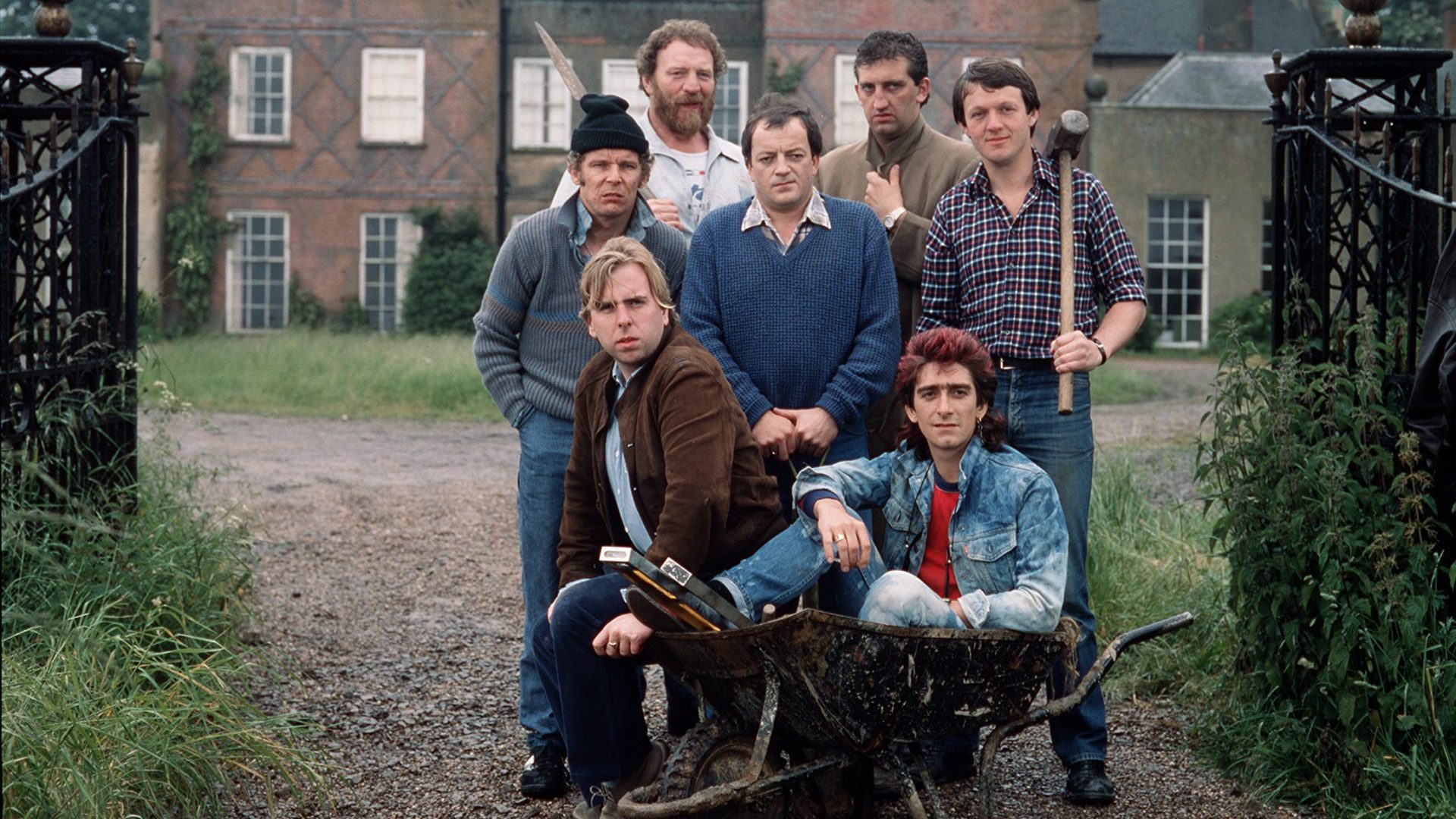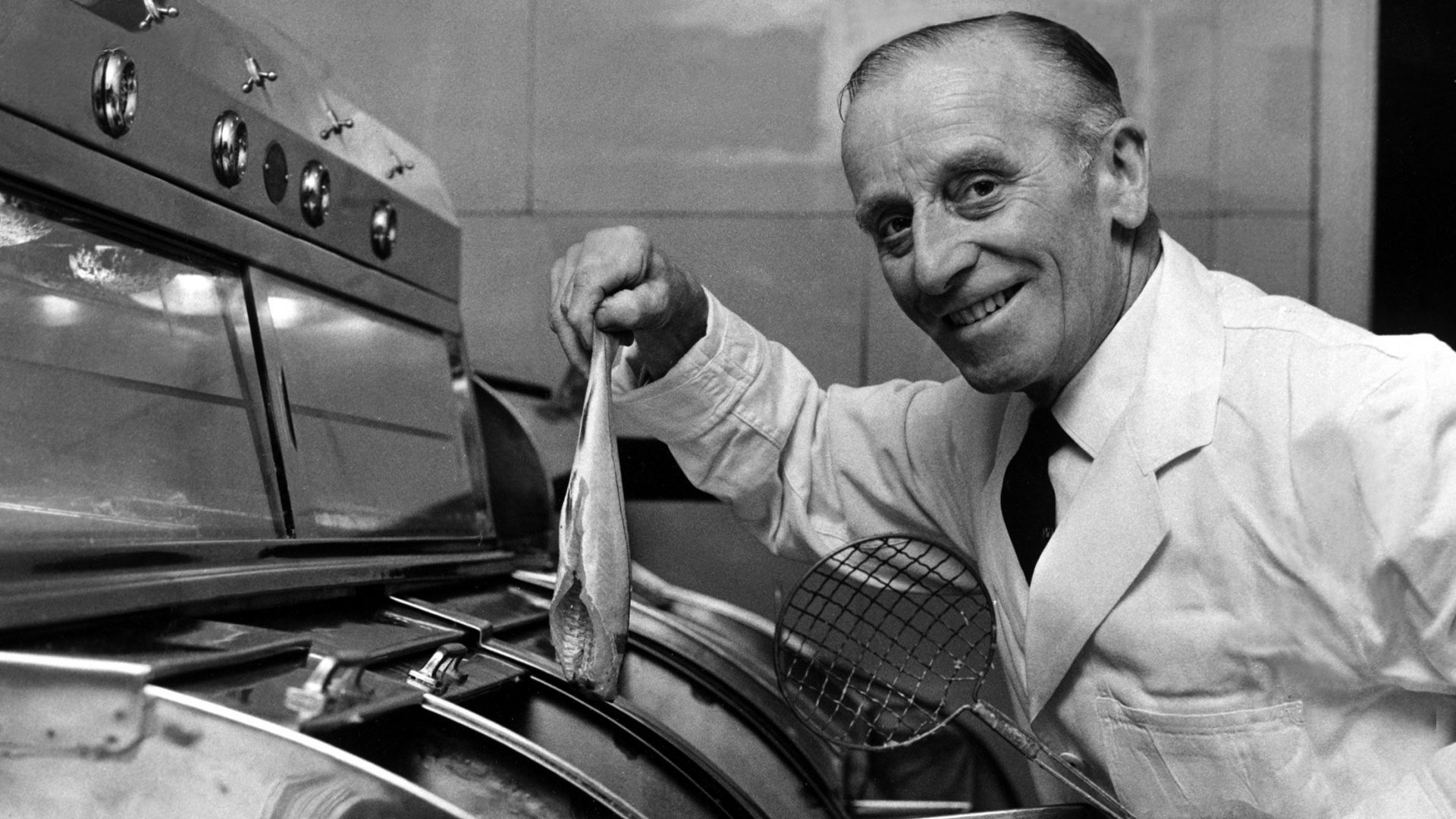Take three underemployed Newcastle bricklayers. Whisk them away from the Thatcher-ravaged North East, dump them in Düsseldorf, set them to work on a building site, house them in a right shithole with four other Brits, add laughs and a touch of racial invective to taste – for these were “different times”.
The idea behind 1980s ratings smash Auf Wiedersehen, Pet couldn’t have been simpler. The origins of this Brits abroad comedy drama were anything but straightforward, mind you.
It’s perhaps because the series wasn’t the easiest of nuts to crack that explains why, fully 40 years on from its first airing, Auf Wiedersehen, Pet still has a lot to say about Britain, her workers and both her and their relationships with the continent. Indeed, with freedom of movement as much of a thing of the past as some of the show’s fashions, you couldn’t blame people for feeling rather nostalgic for the time the British brickie could simply snatch up his spirit level and catch a ferry out of Felixstowe without having to jump through hoops for a work visa.
A comedic tale centring on a bunch of blokes from Newcastle – even if you’re unfamiliar with AWP, you might have figured out Dick Clement and Ian La Frenais had a considerable hand in the show. Though rightly acclaimed for creating Porridge, the duo’s first taste of fame came courtesy of The Likely Lads (1964-66), the story of feckless womaniser Terry and responsible, one-woman man Bob and their North East-based misadventures.
It was show so good that it inspired a superior sequel, Whatever Happened to the Likely Lads? (1973-74) and a half-decent feature spin-off (1976) in which Terry had – shockingly for the time – a German girlfriend. It seemed that no matter what else Clement and La Frenais did for a long while, they were among Hollywood’s hottest script doctors – something was always summoning them back to South Shields.
All of which said, Auf Wiedersehen, Pet wasn’t Clement and La Frenais’ idea. Rather it was pitched to them by the Durham-born Franc Roddam, then celebrated as the director of Quadrophenia, later to be heralded for creating MasterChef. Roddam had a friend, Mick Connell, who, with opportunities poor in the UK, plied his trade as a bricklayer in West Germany. Working off the books and not entirely legally, Connell had survived various scrapes during his time on the continent. Surely, Roddam asked the dynamic duo, there was the material here for a drama series?
Though Dick and Ian agreed, they felt that the success of Auf Wiedersehen, Pet – has the title of a TV show ever better summed up the situation at hand? – would depend upon the characters and the casting. To play Dennis Patterson, the lead character, a man racing towards middle age and divorce, they signed Tim Healy. The leader of the group, Dennis was gruff but fair. Far more pleasant was Neville Hope, a newlywed desperate to provide for his young wife. With Nev the conscience of the gang, Kevin Whately – a reliable actor with a real gift for decency – couldn’t have been better suited to the role.
Over the course of the original two series of AWP, Dennis and Neville performed something of a parental double-act. And if they were mum and dad, the juvenile delinquent of the group was Oz. An accident waiting to happen, Leonard “Oz” Osborne would prove devilishly difficult to cast. Then a tearaway by the name of Jimmy Nail turned up at an open audition. “I took one look at that face and his size,” remembers Ian La Frenais, “and I thought: ‘Oh, please let him be able to act! At least a little!’”
A stranger to discipline with no formal training, Nail nevertheless nailed the audition. And so the creators had their core trio of Geordie labourers. Next stop, Düsseldorf!
Or rather, Elstree. Yes, as with so many films and TV shows, AWP was set in one place but shot in another. Even when the cast and crew did shoot in Germany, they ended up spending more time in Hamburg than Düsseldorf – Hamburg being home to the building site that the art department recreated, albeit on a smaller scale, back home in Hertfordshire.
Not that any of this really mattered. Far more a show about people than places, Auf Wiedersehen, Pet shone because of its characters and their situation. To paraphrase an old Hollywood maxim, no one comes away from a drama humming the location work (by contrast, the show’s theme song, the late Joe Fagin’s That’s Livin’ Alright, would prove so catchy, it’d make the top 10).
As for said situation, it was made that much worse for Dennis, Neville and Oz due to their lodgings bearing more than a passing resemblance to a second world war Stalag. Not only that but they had to share with four fellow Brits – London ladies’ man Wayne (former rocker Gary Holton), muscle-bound Bristolian Bomber (pro wrestler and top stuntman Pat Roach), stuttering Scouser Moxey (RADA graduate Christopher Fairbank) and the world’s most boring Brummie, Barry (a youngish Timothy Spall). Remarkably, this ragtag band came to be known as The Magnificent Seven.
At this point, those unfamiliar with the show might assume that we were in for plenty of jokes at the expense of the Germans and Germany. Auf Wiedersehen, Pet contained none of the cheap sitcom gags about Germans that TV audiences heard in Mind Your Language. For, despite the frequent use of the words “Jerry” and “Eric”, AWP was not a programme out to demonise the old enemy.
Quite the opposite, in fact – in series one, three of the seven actually go out with German women, with one – roving-eyed Wayne, no less – staying behind to settle down with Lysette Anthony’s secretary, Christa. He even urges the hapless Barry to be direct when making contact with the local ladies, resulting in the immortal chat-up line: “Er… would you like to come back to our hut?”
And then there’s Oz, who barely lets an hour pass without reminding everyone that the Luftwaffe bombed his granny’s house but is regularly embarrassed to have his bacon saved by the very people he can’t stand.
Neville, meanwhile, becomes the site hero when he shields an unexploded bomb from a JCB. From this will grow a touching relationship with Helmut (Lex van Delden), a local brickie who insists the brave Geordie meet his family and enjoy their hospitality. Oh, and the bomb? Yeah, of course it was one of ours.
Featuring fine guest turns from Ray Winstone as an army deserter and Michael Elphick as drunken site nuisance Magowan, Auf Wiedersehen, Pet could have run and run. It’s to the credit of its creators, however, that the show quit while it was ahead, a change in German tax law leaving the boys little choice but to return home, a mixed blessing made more digestible by the fact that Kevin Keegan’s just signed for Newcastle United!
And there things might have ended had the demand for a second series not been all but impossible to ignore. So it came to pass that, in 1986, Clement and La Frenais decided to put the gang back together, initially to help the newly engaged Barry complete some work on his house, then later to head out to Spain to renovate a swimming pool for Scottish tough nut Ally Fraser (the always brilliant Bill Paterson).
Years after series two aired, Jimmy Nail would say that he felt the storyline and the setting was far too glamorous for the good of the programme, a point of view both Clement and La Frenais agreed with. But as the austerity of the early 1980s had given way to a boom period, there was something rather fitting about our boys moving up in the world.
Heading to Spain, meanwhile, gave the writers a chance to investigate such phenomena as the “Costa Del Crime” (Fraser becomes bosom buddies with James Booth’s fugitive porn baron Kenny Ames) and the growing population of British expats who love the fact that you can get the British papers in time to enjoy a dinner of egg, chips and lager on the terrace of Ye Old Fat Ox in Fuengirola.
Whether there was too much sun and sangria seems even less important when weighed against the joy of spending time in the company of Dennis, Oz and co. If there’s a scene that best captures the essence of the series, it’s a lunch break at an anonymous service station during which the boys debate who’d be who if they were the real Magnificent Seven. To summarise the results, Dennis is Yul Brynner, everyone else wants to be McQueen and no one remembers Brad Dexter, “the gadgey what saved Frank Sinatra’s life”.
Rather than riding off into the sunset, series two ended with the seven aboard a boat bound for Morocco, with the newly married Barry and his groomsman at the mercy of an on-the-lam Ally Fraser.
And while two very successful series would air on the BBC in the 2000s, here’s where we’ll end the AWP story, in part because those later series ditched the European locations in favour of the American West and Cuba but more pertinently because Gary Holton died of a drug overdose shortly before the end of the second series shoot. The Seven had lost their Horst Buchholz and nothing was ever quite the same again.
Closing the book on Auf Wiedersehen, Pet here also makes sense what with this being the New European. At a time when views weren’t terribly reconstructed and the war was fresher in the memory, Dick Clement and Ian La Frenais dared to suggest the continent could rub along quite nicely, with the occasionally off-colour remark (“The words ‘fair’ and ‘German’ don’t go together in my book, pal,” rants Oz) offset by the occasional acknowledgement that not everything’s best in Blighty (“Sex is in its infancy in Gateshead,” Mr Osborne observes after a night at Düsseldorf’s biggest brothel).
Not that this message was the reason for AWP’s existence. Hell, it mightn’t even have been a conscious decision on the part of the writers. No, like all the best comedy dramas, Auf Wiedersehen, Pet lingers long in the memory thanks to it being both dramatic and comedic. That people are more or less the same all over is then perhaps a universal truth common to many a great TV show.
Watching it now, post-Brexit, adds a new poignancy. Perhaps there are still small teams of British workers who head off into the EU “on holiday”, hiding their tools under their beach towels and swim shorts. But if you want to work legally in Europe now, in most cases you will need a firm job offer with pay through the books and you will need to satisfy strict criteria on minimum salaries, levels of education and skills, and you’ll have to be able to communicate in the local language much better than Oz and Barry ever could.
In some ways, then, Auf Wiedersehen, Pet seems to come from a golden age, the ultimate story of the British working man abroad – in the days when he was allowed to work abroad, of course.



